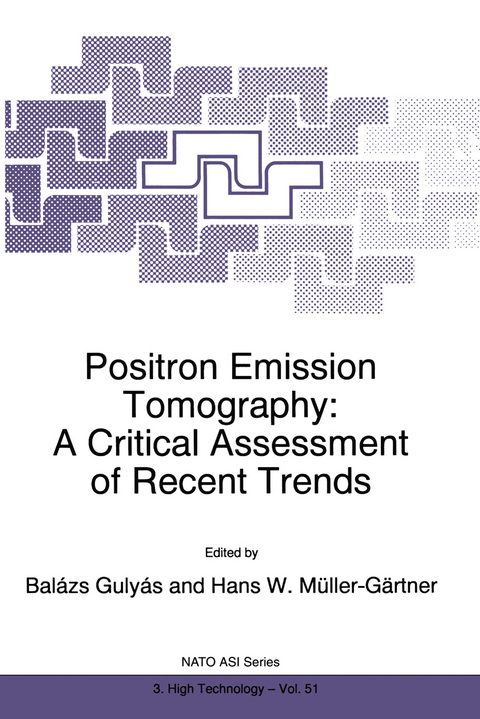
Positron Emission Tomography
Springer (Verlag)
978-94-010-6097-4 (ISBN)
A critical summary of the state of the art of PET technology and related disciplines (camera physics, radiochemistry, radiopharmacology, computerised brain atlases and databases, etc.), plus a survey of the most recent developments in the clinical and neuroscience applications of PET.
The chapters systematically guide the reader from the basics of the technique - including new camera designs, new drugs, and new statistical and image processing approaches - through its most important clinical applications - in neurology, psychiatry and oncology - to the most sophisticated neuroscience applications, including research into human sensory and motor systems, the functional organisation of imagery, volition, attention and consciousness in the human brain.
one: How to establish and run a PET Center?.- 1. Planning a proposal for a PET centre.- 2. The use and registration of PET radiopharmaceuticals. European and world trends.- 3. FDG distribution - a new market trend.- 4. Status of clinical PET in the USA and the role and activities of the Institute for Clinical PET.- two: PET: Novel methodological approaches.- 5. Recent trends in PET camera designs.- 6. Strategies for radioligand development: Peptides for tumor targeting.- 7. Development of PET radioligands for the quantitation of serotonin receptors in the human brain.- 8. The renin-angiotensin system.- 9. Membrane transporters.- 10. A deformable high resolution anatomic reference for PET activation studies.- 11. Registration: a powerful tool to combine information provided by different imaging modalities.- 12. Quantification of FDG uptake using kinetic models.- 13. Cavinton affects the kinetic constants of FDG accumulation: an application of registration and kinetic modeling.- 14. Whole body scanning.- three: PET in oncology.- 15. Positron emission tomography in oncology. In vivo measurements of protein synthesis in tumors.- 16. Diagnosis, differential diagnosis, and follow-up of tumors by means of FDG PET.- 17. Clinical application of whole-body [18]-FDG-PET in malignant melanoma.- 18. Evaluation of metastatic lymph nodes by means of FDG PET.- 19. Diagnosis, differential diagnosis, and follow-up of intracranial tumors with PET.- four: PET in neurology and psychiatry.- 20. PET studies in neuropharmacology. Novel approaches.- 21. PET studies of the dopamine hypotheses in schizophrenia.- 22. PET and epilepsy in adults.- 23. Mapping cerebral responses to volatile anesthetics in humans.- 24. The effect of a single-dose intravenous vinpocetine on chronic 291 stroke patients.A PET study.- 25. Coupling between cerebral blood flow and metabolism in the primate: methodological and pharmacological issues.- five: PET in neuroscience research.- 26. BrainMapTM: Electronic integration of mind and brain.- 27. Designing activation experiments.- 28. The human motor system: principles versus plasticity.- 29. Activation of the visual ventral stream in humans: an fMRI study.- 30. PET and fMRI studies of cerebellar function in sensation, perception, and cognition.- 31. How to use neuroimaging to study visual attention.- 32. Characterising selective attention with positron emission tomography. Neurophysiological investigations.- six: Appendix.- 33. PET centers and PET projects in Central and Eastern Europe.- 34. PET Centres around the world.- 35. List of contributors.- 36. Index.- 37. Color plates.
| Reihe/Serie | NATO Science Partnership Sub-Series: 3 ; 51 |
|---|---|
| Zusatzinfo | IX, 482 p. |
| Verlagsort | Dordrecht |
| Sprache | englisch |
| Maße | 160 x 240 mm |
| Themenwelt | Medizin / Pharmazie ► Medizinische Fachgebiete ► Neurologie |
| Medizin / Pharmazie ► Medizinische Fachgebiete ► Onkologie | |
| Medizinische Fachgebiete ► Radiologie / Bildgebende Verfahren ► Radiologie | |
| Naturwissenschaften ► Biologie ► Humanbiologie | |
| Naturwissenschaften ► Biologie ► Zoologie | |
| ISBN-10 | 94-010-6097-5 / 9401060975 |
| ISBN-13 | 978-94-010-6097-4 / 9789401060974 |
| Zustand | Neuware |
| Informationen gemäß Produktsicherheitsverordnung (GPSR) | |
| Haben Sie eine Frage zum Produkt? |
aus dem Bereich


